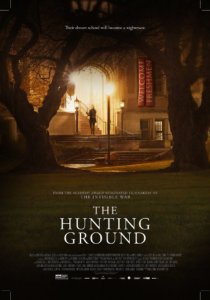 “The Hunting Ground,” Kirby Dick’s documentary about sexual assault on college campuses across America, recognizes there is a major, widespread problem in this country when it comes to rape. Dick makes an effort to serve all those survivors affected. No instance of rape is too small.
“The Hunting Ground,” Kirby Dick’s documentary about sexual assault on college campuses across America, recognizes there is a major, widespread problem in this country when it comes to rape. Dick makes an effort to serve all those survivors affected. No instance of rape is too small.
But his target becomes far too wide and the movie’s subject too broad in scope. Universities, athletic programs, fraternities and college culture in general are all brought under fire. What exactly are Dick and his researchers attacking, other than to say that The Hunting Ground is everywhere? Dick has a powerful cause but not a clear villain or actionable agenda, and on a dramatic level it lacks the compelling figureheads or even the relatable protagonists to make us feel this problem most deeply.
The number of sheer numbers in this film is staggering and overwhelming. Less than 8 percent of men commit 90 percent of sexual assaults. Only 2 to 8 percent of all reported rape cases are actually false. Less than 4 percent of all college students are athletes, and yet 19 percent of athletes supposedly commit rape.
You could make a movie about any one of those statistics right there. “The Hunting Ground” makes a disturbing diversion to see how fraternities play into rape culture, with dozens of girls reciting the slogan about frat SAE, “Sexual Assault Expected,” before cutting to a video in which pledges chant in front of a sorority house, “No means Yes, Yes means Anal.” The Greek system is so weirdly institutionalized in a way that demands a deeper look, but Dick is on a crusade to tell every woman’s story.
Compare this to Dick’s last film, “The Invisible War.” Even though it was released just a few years ago, that movie didn’t come out in the same climate for talking about rape that we have today. And yet that film made waves because it made the US Military into a shocking source of institutional corruption harboring rape. In Kori Cioca, Dick found a strong-willed survivor with a pressing need for support that tied her sexual abuse case to the broader healthcare problems currently faced by veterans. “The Hunting Ground” only knows assault and arguably has far too many young women telling the same story.
“The Hunting Ground” is at its best when it’s a portrait of a victim and the psychology behind their post-traumatic stress. Two women profiled in the film lead a national support group and have faced Twitter death and rape threats as a result. In one scene, a young woman goes on an online message board from another country only to use Google Translate and learn that the poster thinks she needs to die.
“Whatever it takes, it has to be done. This is leadership.” “The Hunting Ground” aims to put names and faces on all the survivors (they don’t want to be called victims) that rape has affected. Through some stirring testimonial, jarringly cinematic pomp and circumstance and even a little help in the form of a Lady Gaga anthem, “The Hunting Ground” couldn’t have been released in a time and culture more willing to listen and help no matter what. But Dick’s goal is monumental and well above the means of what one movie alone can hope to accomplish.
3 stars